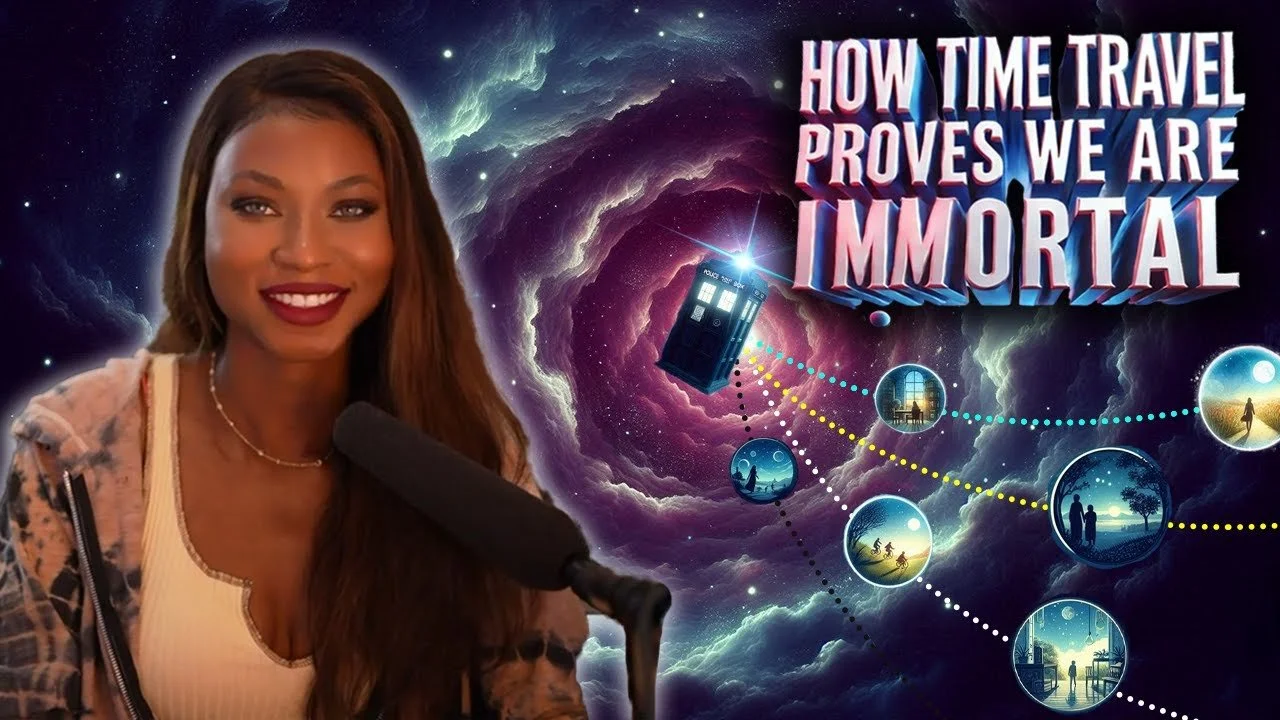What if everything you think you know about death is wrong?
Most of us live with the assumption that death is final a one way exit from existence. But what if that's just an illusion created by our limited understanding of time itself? Today we're exploring how cutting-edge physics suggests that consciousness might be far more resilient than we imagine, and why time travel isn't just science fiction; it's a window into understanding our own immortality.
👉 Watch the full episode: Death, Time Travel & Immortality
You Are a Four Dimensional Being
Here's the mind-bending truth: you're not the three dimensional person you think you are. You're actually a four dimensional being having a three-dimensional experience. Think about it, every photo of yourself from birth until now shows the same consciousness inhabiting different bodies across time. You're not confined to this single moment; you're spread out across spacetime like a snake moving through reality.
Einstein's theory of relativity supports this view through something called eternalism. In physics, eternalism suggests that past, present, and future all exist simultaneously within what's called the "block universe." Time isn't flowing forward; that's just how we perceive it. All moments exist right now, just in different locations within spacetime.
The Science Behind Time Travel
Time travel isn't just possible, it's inevitable. We already know you can travel to the future through time dilation. If you could travel near the speed of light, time would slow down for you while Earth continues at its normal pace. When you return, you'd have effectively jumped forward in time.
Traveling to the past is more complex but theoretically possible through wormholes, cosmic strings, or closed timelike curves. The key insight is this: you cannot travel to a future that doesn't already exist. The future must be a real location in spacetime, just like California is a real place you can travel to.
This means all possible futures exist right now, including the ones where AI takes over, where humanity colonizes Mars, and where you make completely different life choices. They're all equally real, just located in different coordinates of spacetime.
Quantum Immortality and Consciousness
Here's where it gets really wild. According to quantum immortality theory, consciousness cannot experience its own death. Every time you face a potentially fatal event, your consciousness shifts to a parallel reality where you survived. From your subjective perspective, you always experience a "close call" or "near-death experience", never actual death.
Think of reality like a choose your own adventure book. All possible endings already exist within the book. Your consciousness is the reader, making choices that determine which path you experience. But here's the crucial part: even if your character "dies" on one page, you as the reader continue existing, able to explore other paths and outcomes.
Why Nobody Actually Dies
When someone appears to die in your timeline, what's really happening is that you can no longer access that person after a certain date using current technology. But all variants of them still exist throughout spacetime, their childhood self, their teenage years, their adult life. With a time machine, you could visit any version of them you wanted.
From their consciousness's perspective, they never experienced death at all. They simply shifted to a parallel timeline where they survived whatever event appeared to kill them in your reality. Energy cannot be created or destroyed, only transformed. The same applies to consciousness.
The Technology We're Missing
Right now, we're like people from the 1500s trying to imagine cell phones. Our current technological limitations make time travel seem impossible, but that doesn't mean it is impossible. We simply haven't developed the technology yet.
Just as our ancestors couldn't conceive of flying in metal birds across oceans in hours, we can't yet imagine the machines that will allow us to navigate spacetime as easily as we now travel through space. But the physics supports it, and the possibility exists.
Consciousness doesn't end—it just moves.
👉 Watch the full episode: Death, Time Travel & Immortality
Quick Questions
Q: Is there scientific proof that time travel is possible? A: Yes, Einstein's theory of relativity demonstrates that time dilation allows travel to the future, and various theoretical models like wormholes suggest backward time travel is possible.
Q: What is eternalism in physics? A: Eternalism is the view that all points in time past, present, and future exist simultaneously within a four dimensional spacetime block, making the flow of time an illusion of perception.
Q: Does quantum immortality mean we never die? A: According to this interpretation, consciousness always survives by shifting to parallel realities where death didn't occur, meaning you never subjectively experience your own death.
Q: How does the many-worlds interpretation solve time travel paradoxes? A: In the many-worlds model, changing the past doesn't create paradoxes it simply shifts you to a parallel timeline where those changes occurred, leaving your original timeline intact.
Related Episodes
• Quantum Immortality and The Power of Infinity • Karma is a Choice, and All Dimensions Are Here • Edit the past. How to shift realities by editing your memories • What Is Feeding On Your Desires

